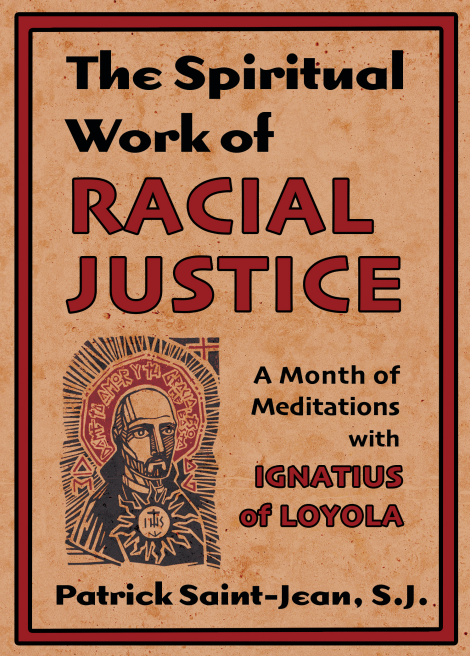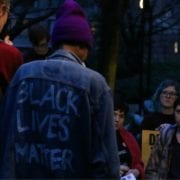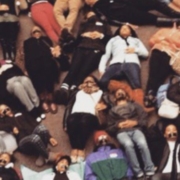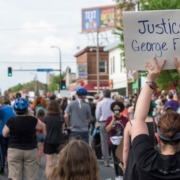Author Q&A: The Spiritual Work of Racial Justice
BY ISN STAFF | September 2, 2021
ISN spoke with Patrick Saint-Jean, S.J., author of The Spiritual Work of Racial Justice: A Month of Mediations with Ignatius of Loyola, published by Anamchara Books.
Saint-Jean designed the book to lead the reader through a month-long Ignatian “retreat,” focusing on racial justice, following the format of St. Ignatius’ Spiritual Exercises. The book provides a guide for the ways in which Ignatian spirituality offers us tools for today’s antiracist struggle, both spiritual and practical. 
Can you share why you wrote this book—and particularly why you wrote this book now, in this moment?
The sin of racism has always existed in America, but the past two years have made this sin more evident to me than ever before, and has challenged each one of us to engage in a deep process of conversion. This year, we are also celebrating the 500 years of the conversion of St. Ignatius of Loyola and I found within myself the spiritual obligation to engage in this conversation through this spiritual conversion lens for God’s glory. I believe that through Ignatius, God has invited me to encounter Him and invite others to meet Him as well on this issue in whatever way we can—and this book is just one of the ways. Albeit, let me quickly say that, this is not just me. I believe that it is for all of us, if only we can see it or if we choose to see it
Why Ignatian spirituality and racial justice? Tell us about how these two interweave with one another.
St. Ignatius of Loyola teaches us to see God in all things. This means that each area of injustice in our world is also a call from God. Ignatian spirituality is very practical, combining the physical and spiritual worlds into one interwoven reality. This means we cannot draw close to God spiritually if we are ignoring the injustice in the world. The Spiritual Exercises that St. Ignatius left us can be applied directly to the situations created by racism, and this is what I show in my book. I have humbly come to believe that it is inconceivable to live a life of faith, love, and charity without Justice. While love, faith, and charity can be the motive of our action, Justice remains the pillar that informs them. Indeed, there can be none of those without Justice.
Who is this book designed for, and how is it intended to be used?
The book is designed for anyone who is sincerely seeking to deepen their relationship with Christ. It could be used as a private devotional book or it could also be easily used in a group setting.
Can you share a brief overview of the four weeks, and explain why you chose this structure?
Week 1 focuses on the reality that we are beloved sinners; in the book, I use this time to look at the history of racism, putting it into the context of repentance and God’s love. The focus of week 2 is the life of Jesus when he was on earth; I use this time to meditate on the historical Jesus as a person of color. During week 3, when we meditate on the Crucifixion, I relate the suffering of Christ to the suffering of the BlPOC community. Finally, in week 4, we look at the Resurrection and the power of possibility to bring justice to our world. Each “chapter” (or “day”) seeks to provide factual information, weaving together the life of St. Ignatius with the reality of racism, followed by inspiration for spiritual growth and meditation.
What type of transformation do you hope this book brings—both for individuals and communities? And from that transformation, what type of action do you hope for from those who use this book in their prayer lives?
I hope this book will bring spiritual transformation to individual lives, helping people to connect more deeply with the Spirit so that God’s power can flow through them and out into the world. And I pray that as individuals open themselves to God at a deeper level, they will spread real and practical changes through our communities. I cannot say exactly what action God will call each person to take, but I hope the book will inspire each reader to ask that question: What does God want me to do, what ought I do, what will I do—today, this week, this year—to fight against racial injustice?









Applied Ignatian Spirituality has the potential to move mountains. It is tough but it is doable. Congratulations to author Patrick Saint-Jean.
This is a book that transformed my life and several people I gave it to. I reviewed this book for a digital magazine which made a difference to several other people. Father Saint-Jean gives very thoughtful ways to change our lives today in regard to sins of social justice. He asks us to think of others with respect and care, no matter who they are. He asks us to go beyond the usual to make sure the person realizes the gifts God has given them in order to assist others, he asks for deep thoughtfulness and outreach to all we have a conversation with, he asks us to pray with each other and delight in the goodness of belonging to the Catholic Church in all its holiness and joy. He is also aware that this will not happen overnight but will take consistent and constant attention to the ‘other’ in our lives. We need to realize that social justice is the constant music in our head to ask God for His assistance.